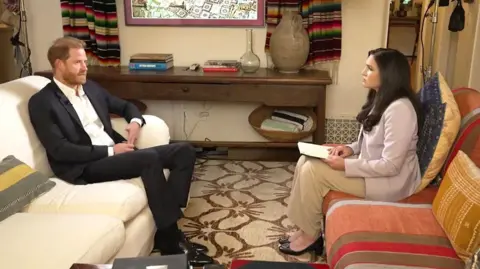In a recent BBC interview, Prince Harry’s revelations have sent shockwaves through the Royal Family, igniting a wave of public debate and media scrutiny. Known for his candid remarks, Harry’s emotional disclosure felt like an “emotional avalanche,” revealing deep personal frustrations and a longing for reconciliation with his family. The interview began with discussions surrounding his security concerns, but quickly evolved into a broader commentary on the emotional toll of his separation from the royal family.
The turning point of the interview occurred following Harry’s legal defeat in his quest to restore his security measures in the UK. This defeat left him feeling vulnerable and contemplative, as he pondered the implications of his words and whether he was ready to speak out publicly. His expressive demeanor suggested a genuine mix of hurt and disillusionment, particularly evident when he disclosed that his father, King Charles III, has remained distant due to these ongoing security issues. Harry’s assertion that he is uncertain about how long his father will be around highlighted the emotional burden he carries regarding familial ties that seem to fray with each passing year.
As the conversation unfolded, Prince Harry revealed a deeper existential discontent, one that transcended mere frustration over diminished security status. He spoke vividly about the impact of this rift on his children, expressing sadness over their experiences—and lack thereof—with their extended family in the UK. The emotional weight of his statements painted a picture of a man grappling with feelings of isolation, a mix of sadness, and a desire for familial warmth during uncertain times.
Harry eloquently deliberated on the delicate balance often required in family disputes. His desire to express grievances hinted at a deeper struggle: the innate wish to confront tensions while aspiring for unity and understanding. He characterized the downgrading of his security as a manifestation of strained relations within the royal household, suggesting that it had become a political pawn in the ongoing family feud. This commentary portrays not only his frustration but also his yearning for peace—an olive branch he extended towards his family, amplifying the urgency of his call for reconciliation.
In a heartfelt plea, Harry emphasized that life is precious and there was little merit in persistent conflict. He sought intervention not just from his father but also from other influential figures, initiating a call for support from broader societal pillars such as the Prime Minister and Home Secretary. This appeal raised eyebrows, considering the potential implications for his family’s public and political dynamics.
While the prince’s emotional vulnerability resonated powerfully, legal realities cast a shadow upon his grievances. A recent court ruling addressed his sense of injustice, with the presiding judge, Sir Geoffrey Vos, stating that changes to his security arrangements were justified given his status as a non-working royal residing outside of the UK. This dispassionate legal perspective contrasted sharply with Harry’s emotional outpouring, emphasizing the challenges he faces in reconciling personal feelings with the stark realities of legal frameworks.
Furthermore, Buckingham Palace’s restrained response mirrored a hesitant parental figure amidst a family quarrel. The Palace articulated a weariness, suggesting that these issues have been thoroughly scrutinized in judicial processes. Their reluctance to intervene in matters ruled upon by the courts revealed a complex dynamic within the institution, highlighting the challenges royal family members face in navigating public sentiment while upholding their traditional roles.
As news of Harry’s poignant revelations continues to reverberate globally, public and media reactions are multifaceted. Harry’s expressions of grief and reconciliation versus the staid traditions of royal protocols and expectations carry significant weight as the family faces a pivotal moment, particularly with the upcoming VE Day 80 celebrations, which will place the Royal Family at the forefront of national commemoration.
In conclusion, Prince Harry’s candid reflections during this BBC interview have not only put a spotlight on his personal struggles but also raised broader questions about family loyalty, the burdens of legacy, and the complexity of navigating one’s identity both within and outside the confines of royal expectations. The emotional undercurrents of his story may have lasting impacts, prompting both the Royal Family and the public to reflect on the intricate interplay of love, duty, and individual fulfillment that characterizes familial relationships.



